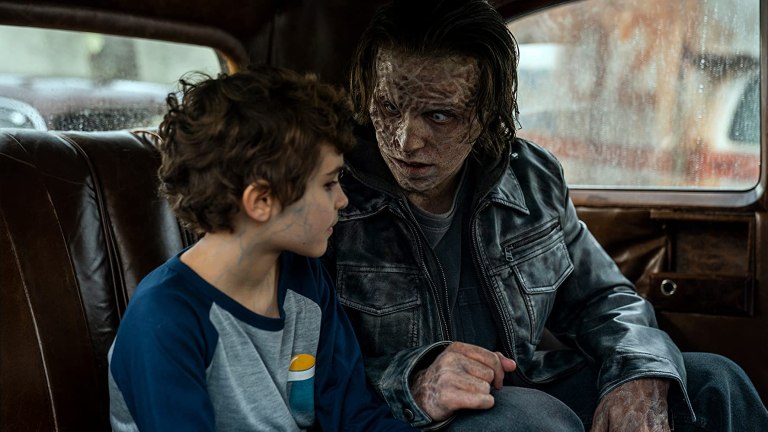NOS4A2 Season 2 Episode 7 Review: Cripple Creek
Sympathy for Charlie Manx is a tough ask, but that's what's being asked of the viewer all the same. Charlie's traumas are laid bare on a confessional NOS4A2.

This NOS4A2 review contains spoilers.
NOS4A2 Season 2 Episode 7
In our recent interview with NOS4A2 showrunner Jami O’Brien, she addresses something very surprising. There are people online who have bought into the lies of Charlie Manx. He claims he’s saving children from bad situations, and there are people who say, “Yes, that sounds right,” and look no further than that. Hopefully, his actions in the second season are enough to put fire to those particular lies, but that doesn’t mean Manx isn’t still a character with more dimensions than first suspected. Oh no, while up on “Cripple Creek,” Bing learns all about the roots of Charlie Manx’s psychosis and just how he became the undead, life-stealing presence who rides around in a Rolls-Royce kidnapping children.
As it turns out, leading children to a dark fate is something of a long-standing Charlie Manx tradition.
“Cripple Creek” is cut pretty neatly into two parts. The main segment concerns Charlie and Bing in the real world, with Bing finally losing his naive faith in Charlie Manx. After all, Bing waited for Manx for 10 years, working patiently to track down and get back the Wraith, and to bring back Charlie from the dead. He knows Charlie’s strengths and weaknesses, his patterns, his routines, his so-called hidey-holes, and pretty much all of his dirty secrets. At least, the ones that exist outside of Christmasland. He’s done nothing but what he’s asked to do, and he’s gone above and beyond all of Charlie’s previous employees, if only because he’s a true believer in a cause that, for Charlie, never existed in any real sense.
The other portion of the episode concerns that backstory alluded to in the introduction. Between the gingerbread gas of Bing and the way Millie sneaks into the old Manx house where Charlie secrets away all of his deepest fears, a whole lot about Manx’s childhood is revealed in a short amount of time, both through the words of the man himself—one of the side-effects of the gas is that it causes people to be more honest with their words—and through what terrifies him more than anything else in the world.
Between the two elements, Charlie’s deepest fears and the origin of his desire to “save” wayward children from broken homes, the character is explained quite a bit. His obsessions, his perseverance, and the twisted darkness that comes from Christmasland and infects every child that walks within its gates. Christmasland, as established, is a place that exists solely within Charlie Manx’s head, so it’s only natural that the things he loves, and the things he fears, would live alongside one another within his mind palace. Those things, and the experiences he had in the past, go a long way towards establishing just what kind of person he truly is. Someone can fake their attitude and personality all day long, but you can’t fake formative experiences.
As it turns out, Charlie (played as a youngster by Aidan Pierce Brennan) comes by his dislike of women from an early age, and his manipulative tendencies come from an early age, too. Charlie has a leadership quality, and the owner of the general store, Mr. Tim (Gary Wilmes), sees him as an easy mark, able to influence the young boys in town to come by the store to perform, ahem, special tasks for him. The promise of leaving town, of leaving his mother’s crowded, stinking whorehouse behind, is enough to turn Charlie’s eyes away from Tim’s rumored behavior and guides Charlie to lead friends directly into the hands of a child predator. Fittingly, Tim knows just what to say to get Charlie on his side, and is smart enough to avoid making any movies on Charlie until he’s already run through most of the boys in town (and Charlie is smart enough keep Tim
Even from an early age, Charlie was manipulative, and adult Charlie (Zachary Quinto) is just as good as manipulating Wayne (Jason David) and Bing (Ólafur Darri Ólafsson) into making choices that run counter to their own best interests. He’s able to use his own back story to twist and turn back around on Bing, and A. Rey Pamatmat’s script does a solid job of walking that line between humanizing Charlie as a potential victim of abuse who comes from a very broken home and showing Charlie as the manipulative monster he would become as a method of escaping his childhood, and as an adult luring children into his Wraith to maintain his immortality. In a sense, Charlie learned from someone truly gifted in the art of luring children, and he puts every one of those tricks he learned into practice on, essentially, everyone he comes into contact with.
That tone is found, in great measure, courtesy of the performers in the hands of director Tricia Brock. Certainly, the episode contains some very good moments visually, but it’s the performances, particularly that of Aidan Pierce Brennan, and the way he reflects aspects of what we already know about the Charlie character established by Zachary Quinto. There’s a consistency to the manner in which he speaks, the gestures he uses, and the methods undertaken to get people to look past their better judgment that rings true for both versions of the character, across a hundred or more years of timespan, whether he’s talking Oscar (Giuseppe Virzi) into going to the general store to be molested or getting Wayne to let him free from the back of the Wraith as Bing tries to crush both of them to death to end their reign of monster terror.
One of the powers of the Wraith seems to be that the kids in the back seat never remember anything good about their parents. All of those positive, happy memories are stripped away during the trip to Christmasland, leaving behind only grievances, anger, resentment, frustration… the very sorts of emotions that young Charlie Manx expresses when talking to the other children, and the sorts of emotions that he manipulates in Bing Partridge towards the parents of the children they steal. Wayne is told, urged, to remember the good things about his mother, and yet that seems to get harder and harder with every minute spent in the company of Charlie Manx.
Such is the nature of memory. The good times are harder to remember than the bad times, and require more effort to cling to, even when you’re not the victim of a soul-leeching psychic monster. However, the good memories might be the only thing that can save Wayne from the terrors of Christmasland and the machinations of the life-long child predator, Charlie Manx.


